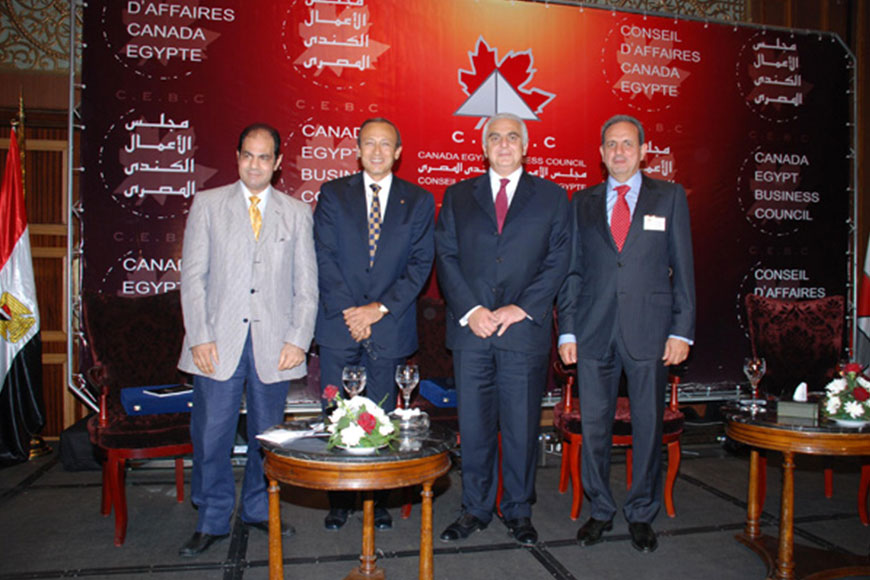
Date
Speaker(s)
Designation
Description
On September 10, Canada Egypt Business Council “CEBC” hosted a special Dinner at the Cairo Marriott Hotel at which H.E. Amin Abaza, Minister of Agriculture and Land Reclamation addressed the topic “Harvesting of the Egyptian Future”.
The main aim of the dinner event was to highlight the needs to develop, modernize and upgrade Egypt’s agricultural domain in order to spur agriculture & boost self-sufficiency in producing our main crops.
CEBC Chairman, Mr. Moatz Raslan made the opening remarks, speaking before a number of Ministers, Ambassadors, prominent guests, journalists and members. Raslan stated that agriculture has always been one of the main sectors as it contributes about 20 percent of the national income and that 36 percent of the Egyptian man power is working in agriculture.
He added that the government in recent years is witnessing great awareness of the significance of agriculture, performing tremendous effort in modernizing the agriculture system and expanding the cultivated land from 5 million acres at the past years to more than 18 million acres at the moment. “This has been done through vast projects as Al Salam Lake, East of the Owainat project, the dessert reclamation projects along with many other projects that are consuming enormous endeavor, billions of pounds & many scientific programs that is attributed by the Ministry of Agriculture”, he said.
Raslan then introduced the keynote speaker H.E. Amin Abaza, who took the podium to discuss the main ministries’ goal, recent challenges, scarce resources and limitations facing the ministry especially for a country with dense population as Egypt.
Abaza described agriculture as being the vital essence of life for all the Egyptian citizens, whether the planting of crops or animal and fishery production are considered the main sources of proteins and nutrition for human beings. “The recent studies on livestock indicates that the per capita consumption of animal protein food resources is 18 grams per day, where as the minimum average per capita world standards is 24 grams per day, so in order to reach the other needed per capita 6 grams per day, we need to develop a vision for the future that seeks vast investments in livestock and local poultry production and the participation of all sectors of the society that can translate theoretical reports into concrete reality . “, he stated.
“Moreover, when speaking about the agricultural crops including vegetables, fruits and mostly important the grains, cotton, rice, maize ,clover and particularly the wheat, in Egypt we have about 18 million acres agricultural surface on which we can cultivate two crops annually and according to the most recent statistics we have 8.2 million acres producing these two crops per year. Out of this particular surface we can’t use more than one third for cultivating wheat and according to average annual production, we can produce around 6.5 to 7 million tons per year”, he added.
Abaza explained that the Ministry of Agriculture has worked diligently in joint effort with all the governmental sectors in order to intensify investments and raise the standards of self-sufficiency, so that agriculture can be equal or even close to our needs of nutrition, putting into consideration the incessant demographic increase we are facing in Egypt as the population increase is more than one million per year.
Central to this endeavour, Abaza elaborated, will be efforts to restructure agriculture domain to better accommodate society’s needs of nutrition and increase efficiency of cultivated land through improving productivity of current agriculture land and enhance dessert reclamation.
“But while we work to achieve that, we still have many challenge to face one of which is the scarcity of water as the main element for irrigation and agriculture. “Water resources where the same when the population of Egypt was 20 million, 60 million and will still be the same when we reach 130 million”, he said.
According to Abaza, improving effectiveness of agriculture surface and increase production of animal husbandry can mainly be done through the rational utilization of water and considering it as one of our main national goals.
The minister then described that agriculture in Egypt constitutes of: Modern and developed agriculture, using high technology that may allow us to rehabilitate more land and cultivate more crops leading to closing the gab between our nutrition needs or self-sufficiency and production of crops. The other type is simple, traditional agriculture that is applied on approximately 65 percent of Egypt’s agricultural land as being a part of Egyptian farmers inherited culture.
Finally he noted that increasing farmers awareness to use the modern agriculture system and encouraging massive investment on that sector is the main ministries’ objective, despite the many obstacles and constrains they face, out of which is the dispersion of agricultural properties, urban encroachment, limited water resources, yet remarkable gains have been achieved through vertical and horizontal expansions with positive bearing on plants, animal and fishery production.
Following the speech of His Excellency, there was a panel discussion moderated by Mr. Magdy Mehana, Senior Columnist, Al-Masry Al Youm, covering vital issues regarding the health of the Egyptian citizens, cancer causing pesticides and the rules and regulations applied when using these pesticides.
The Minister of Agriculture and Land Reclamation then proceeded to answer questions from the audience on a number of topics touching on the usage of pesticides, cost of producing fertilizers, strategies applied by the ministry regarding avian flu.








